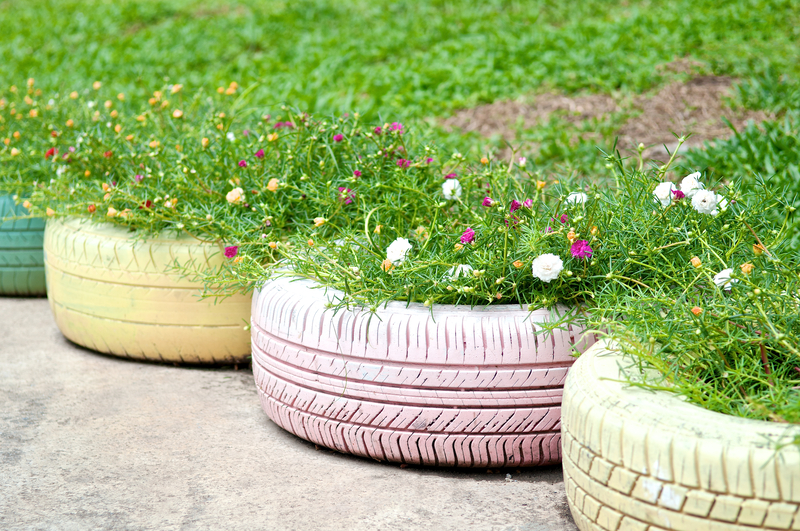Navigate Skip Hire with Confidence: Dos and Don'ts
Posted on 08/10/2025
Whether you're revamping your home, managing a construction project, or simply conducting a garden clear-out, hiring a skip can be the key to efficiently managing waste disposal. However, the process is often surrounded by uncertainty--what can you put in a skip? How do you choose the right provider? With a range of options and strict regulations, it's vital to navigate skip hire confidently. This comprehensive guide will walk you through the essential skip hire dos and don'ts, ensuring you avoid unnecessary costs and legal pitfalls.
Why Skip Hire Is Essential for Your Project
Skip hire services have become an indispensable part of property renovations, construction projects, and large-scale cleanouts. The reasons for their popularity include:
- Time-saving: No repeated trips to the tip.
- Cost-effective: Pay a single fee--no surprise charges for waste removal.
- Eco-friendly: Professional skip companies sort and recycle much of your waste.
- Compliance: Legal and safe waste disposal meets local regulations.
- Convenience: Delivered and collected at your chosen times.
However, to truly benefit, it's crucial to understand best practices and potential pitfalls in skip hire.

Preparing for Skip Hire: What You Need to Know
Understand Your Waste
Before booking a skip, assess the type and volume of waste your project will generate. Typical items that can go in a skip include:
- General household waste
- Garden waste
- Construction debris (bricks, rubble, wood)
- Furniture and non-electrical fittings
But, beware! Certain materials are strictly prohibited, which we'll cover in detail below.
Choosing the Right Skip Size
Selecting the right skip size is vital for cost and compliance. Skips come in various sizes, commonly from 2-yard mini skips to 40-yard roll-on roll-offs. Here's a quick guide to typical skip sizes:
- Mini (2-3 yards): Ideal for small household jobs or tight spaces.
- Midi (4-5 yards): Suitable for bathroom or kitchen refits.
- Builders' (6-8 yards): A popular choice for larger renovations or garden clear-outs.
- Large (10-12 yards): Perfect for major construction or commercial projects.
Overestimating means unnecessary expense, while underestimating leaves you with excess waste. Always consult with your skip hire provider if unsure.
Skip Hire Dos: Maximise Efficiency and Stay Legal
1. Do Check Permit Requirements
If your skip will be placed on a public highway or road, a skip permit--sometimes known as a licence--is typically required, and it's the law. Contact your local council or discuss with your skip hire company who may arrange it for you. Avoiding a permit can result in significant fines and even removal of the skip.
2. Do Choose a Licensed Skip Hire Company
Confirm the provider holds a valid Waste Carriers Licence and operates according to environmental standards. Responsible, professional companies will manage waste disposal legally and ethically, giving you peace of mind and protecting you from liability.
3. Do Plan Your Skip Placement
Avoid access issues or safety risks:
- Ensure flat, stable ground for skip delivery.
- Allow enough clearance for dropping off and collecting the skip.
- Keep well away from driveways' overhangs and obstacles like trees or telephone wires.
- Place skips away from public access routes if possible, to discourage fly-tipping.
4. Do Separate Recyclable Materials
If your skip hire company offers recycling facilities, segregate materials like metal, wood, and cardboard. This reduces landfill waste and can sometimes save you money, as mixed waste is often more expensive to process.
5. Do Fill the Skip Safely and Responsibly
- Distribute heavy items evenly to prevent tipping.
- Break down large objects where possible to maximise space.
- Keep the skip level--anything above the rim may create hazards and could be refused collection.
- Follow your provider's guidance for hazardous waste and special disposal needs.
Skip Hire Don'ts: Avoid Costly Mistakes and Legality Issues
1. Don't Put Prohibited Items in the Skip
Even though skips are robust and versatile, certain items are universally banned due to environmental and safety risks. Commonly prohibited materials include:
- Asbestos and roofing felt with asbestos content
- Tyres and batteries
- Chemical waste, paints, solvents, adhesives
- Gas canisters or aerosols
- Electrical appliances (TVs, fridges, freezers)
- Medical waste
- Plasterboard (unless a separate skip is arranged)
Disposing of these inappropriately can lead to serious fines and cause harm to the environment. If in doubt, always check your skip hire provider's terms or consult with your local council's waste team.
2. Don't Overfill or Overload the Skip
It can be tempting to get your money's worth, but most skip companies follow a strict level-fill policy. Overfilled skips may not be collected for safety reasons, leaving you liable for extra charges or forced to remove the excess yourself.
3. Don't Delay Your Booking or Collection
During peak seasons--particularly spring and summer--skips can book up quickly. Arrange your skip in advance and discuss the collection schedule to avoid costly extensions or delays that impact your project. Most companies charge daily or weekly rates for extended hire.
4. Don't Place the Skip in Unsafe or Inaccessible Locations
- Never block emergency exits, fire hydrants, or public walkways.
- Ensure access for collection vehicles at all times.
- If on private property, avoid damaging driveways or underground utilities.
5. Don't Ignore Local Regulations
Different areas may have unique restrictions on skip placement, the types of waste, and permitted skip sizes. Ignoring local policies can mean not only fines but also wasted time as you adjust to meet the correct standards.
Common Questions about Skip Hire
How Long Can I Keep a Skip?
Skip hire duration ranges from a few days to several weeks. Confirm your expected timeframe at booking and notify the company if you need an extension (fees may apply).
What Should I Do If I Have Hazardous Waste?
Never put hazardous materials into a general waste skip. Speak to your skip supplier about specialised skips or contact your local authority for approved disposal locations.
Can I Put a Skip on a Public Path or Road?
Yes, but only if you have the necessary permit. Placement on public land without permission is illegal and may see your skip removed and a fine imposed.
Is Fly-Tipping into My Skip My Responsibility?
Sadly, yes. If others illegally dispose of waste in your skip, you may be liable. To prevent this:
- Choose off-road placement if possible.
- Cover the skip overnight.
- Work with reputable companies offering skip covers or lockable skips.
Maximise Your Skip Hire Investment: Expert Tips
- Group your waste by type: Place large, flat items at the bottom, followed by heavier debris (like bricks or soil), then lighter waste on top.
- Break down bulky items: Save space by dismantling furniture or cutting down tree branches.
- Consult your provider: For specialist wastes like plasterboard, many providers offer dedicated solutions.
- Book early: Particularly during busy periods.
- Keep paperwork: Store receipts and permit details in case of future disputes or inspections.
The Environmental Impact: Choosing a Sustainable Skip Hire Company
If sustainability is important to you, ask these questions before booking:
- Where does my waste go? Aim for providers with high recycling rates (some exceed 90%).
- Do they offer dedicated recycling skips? Segregation at source improves environmental outcomes and can reduce costs.
- Are they members of industry trade bodies? Organisations like the Environment Agency or Waste Management Industry Training and Advisory Board signify reputable standards.

Conclusion: Skip Hire with Confidence
Selecting the right skip hire solution doesn't have to be daunting. By following these skip hire dos and don'ts, you'll protect your property, save money, and ensure your waste is handled responsibly. The foundation of successful skip hire is preparation--understand both your obligations and the services your chosen provider offers, and don't hesitate to ask for guidance. In short, navigate skip hire with confidence by making informed choices every step of the way.
Key Takeaways: Dos and Don'ts of Skip Hire
- Always use a licensed skip hire company and obtain necessary permits.
- Plan waste type and skip size in advance to reduce costs and hassles.
- Never dispose of prohibited or hazardous items in a general skip.
- Keep skips level, secure, and placed safely.
- Consult providers on recycling and sustainable options where possible.
- Stay aware of local regulations to keep your project compliant and problem-free.
By remembering these rules, you will seamlessly navigate the process and make the most out of your skip hire experience!

 020 3744 2205
020 3744 2205











